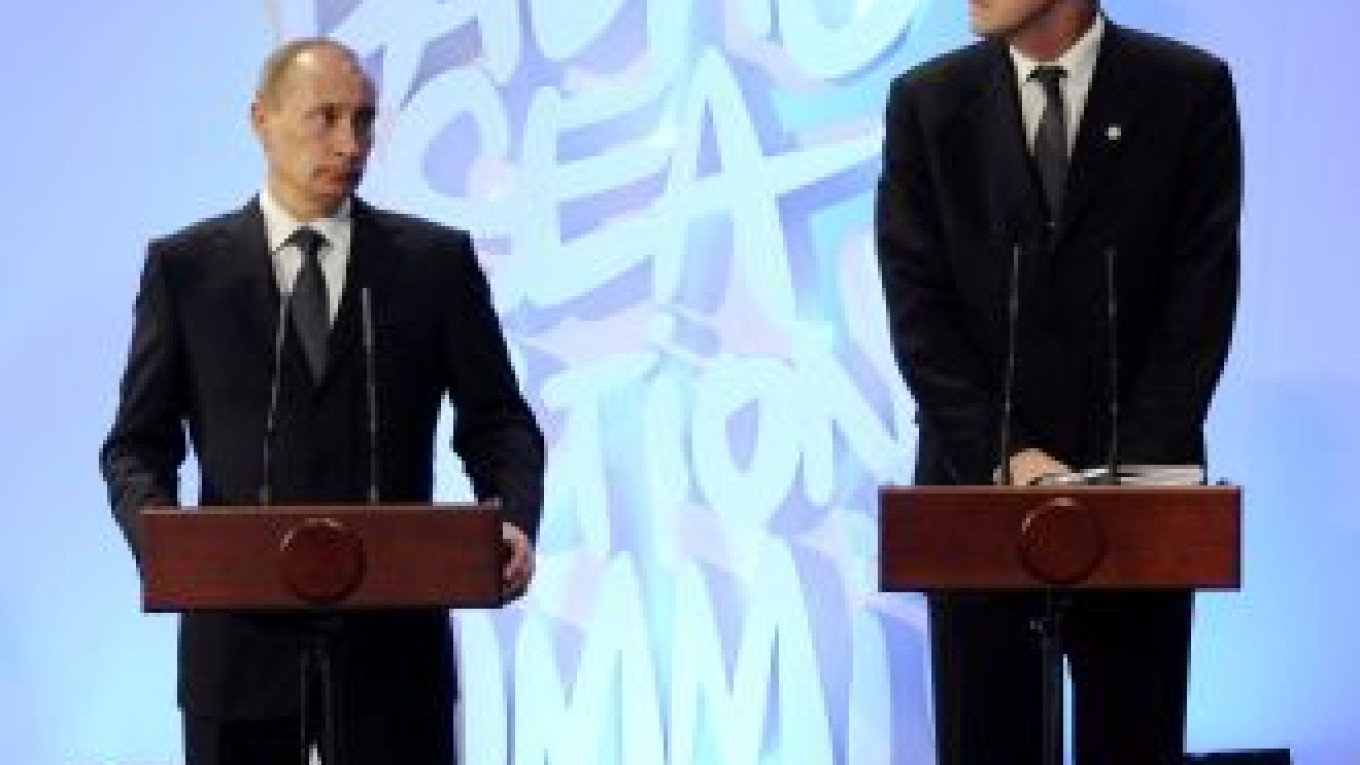Prime Minister Vladimir Putin promised Baltic statesmen Wednesday that Russia would curtail its sewage dumping and reassured them that the Nord Stream pipeline would not harm the Baltic Sea, as Finland was nearing a decision on the final permit for the pipeline.
Putin, who was in Finland for a Baltic Sea environmental summit, also said Russia could extend its low duties on timber exports to Finland, an apparent attempt to encourage a positive pipeline verdict.
Finland will make a decision on whether to issue a water permit, clearing the project of any pollution risks, within the next few days, the country's Prime Minister Matti Vanhanen said Wednesday. It would be the last of three permits required from Finland and the last for a Gazprom-led consortium, including BASF SE/Wintershall Holding, E.On Ruhrgas and Gasunie, to begin work.
The consortium, Nord Stream AG, said in November that it was aiming to get the permit by the end of last year to start construction by the end of March. The pipeline would carry Russian gas to Germany under the Baltic Sea.
Putin emphasized that Gazprom and its partners made a considerable investment of 10 million euros ($13.74 million) to study the ecology of an area the size of Denmark and even gave way on concerns that he described as “speculative.”
“We acted in accordance with the well-known Russian proverb, 'Measure seven times, cut once,'” he said, addressing the Baltic Sea Action Summit in Helsinki.
Putin, in colorful terms, expressed his confidence that Europe would continue to rely heavily on Russian gas over the next couple of decades, despite the progress made by alternative energy sources and competition from suppliers of liquefied natural gas, or LNG, which is gas cooled to be liquid for transportation by tankers.
“Unfortunately or fortunately, neither solar power, nor woods nor dried manure — nothing — will replace hydrocarbons in the next 15 to 20 years,” he said.
Pipeline gas will “always” be cheaper than LNG, he stated.
He also noted that discussion of Nord Stream was more emotional than other European energy plans, saying other underwater pipelines — which carry more than a third of gas deliveries to Europe under the Northern, Black and Mediterranean seas — didn't raise as many concerns on the planning stage.
In addition to ensuring Nord Stream safety, Russia will do more to make the Baltic Sea cleaner, Putin said. The government will present a federal program to that effect in May and has been consistently funding the upgrade of sewage treatment facilities in and around St. Petersburg and Kaliningrad, he said.
Last year, Finnish authorities already granted Nord Stream a permit to begin clearing old, underwater munitions and use the country's exclusive economic zone. The remaining water permit is the responsibility of the Western Finland Environment Permit Authority.
Putin said Russia was studying whether it could extend the freeze on higher timber export duties, a relief for Finland's sprawling timber processing industry, beyond this year. Russia initially planned to introduce prohibitively high duties in 2009 to prompt foreign investment in local processing facilities but delayed the move twice at Finland's request.
A Message from The Moscow Times:
Dear readers,
We are facing unprecedented challenges. Russia's Prosecutor General's Office has designated The Moscow Times as an "undesirable" organization, criminalizing our work and putting our staff at risk of prosecution. This follows our earlier unjust labeling as a "foreign agent."
These actions are direct attempts to silence independent journalism in Russia. The authorities claim our work "discredits the decisions of the Russian leadership." We see things differently: we strive to provide accurate, unbiased reporting on Russia.
We, the journalists of The Moscow Times, refuse to be silenced. But to continue our work, we need your help.
Your support, no matter how small, makes a world of difference. If you can, please support us monthly starting from just $2. It's quick to set up, and every contribution makes a significant impact.
By supporting The Moscow Times, you're defending open, independent journalism in the face of repression. Thank you for standing with us.
Remind me later.


